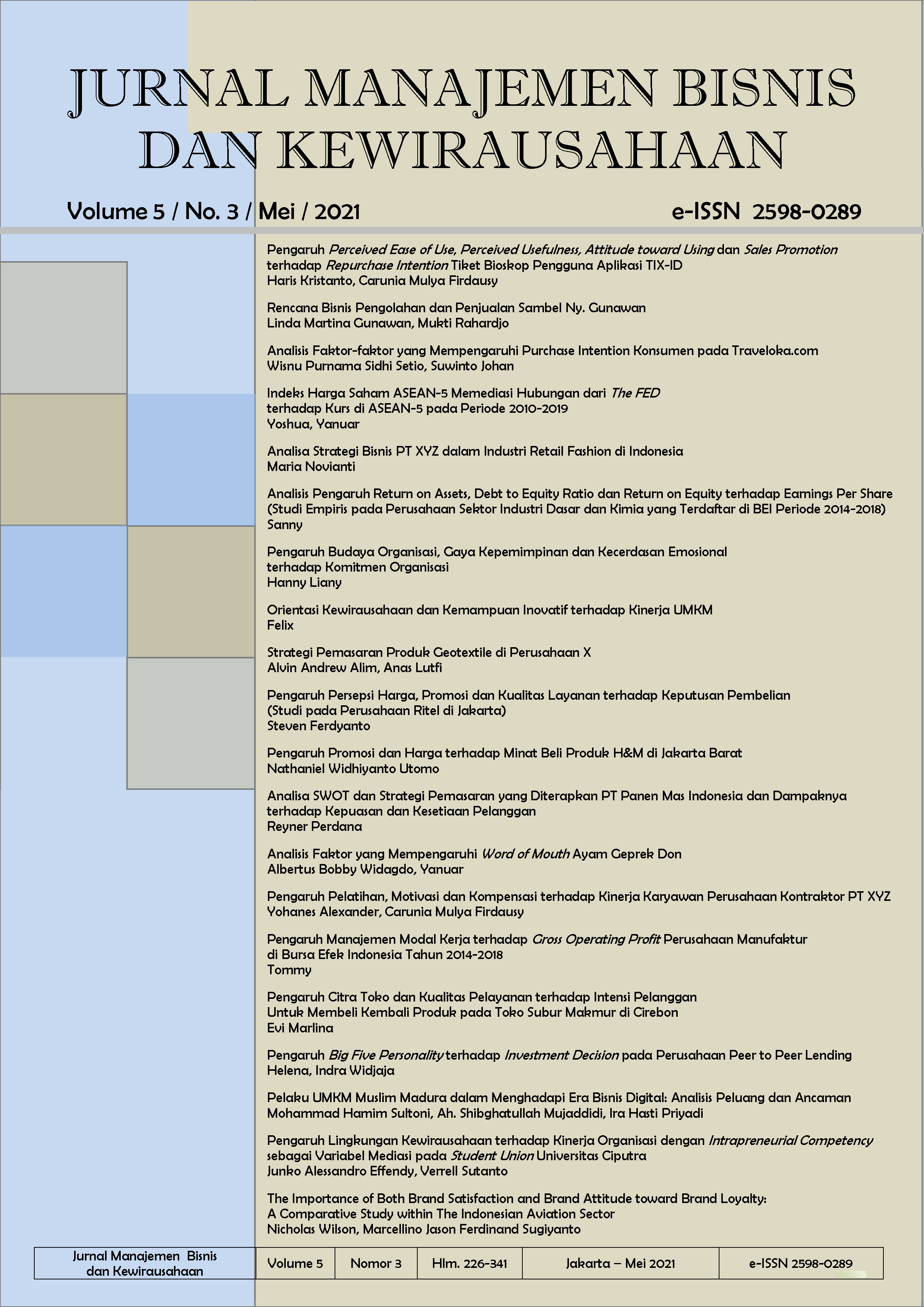Analisis Faktor-faktor yang Mempengaruhi Purchase Intention Konsumen pada Traveloka.com
Main Article Content
Abstract
The purpose of this research is to analyze correlation between information quality, perceived web security to perceived trust, correlation between convenience, web interface quality to perceived ease of use, and correlation between brand image, perceived trust and perceived ease of use to purchase intention consumer at Traveloka.com. This study is a descriptive research, the sampling technique used in this study is nonprobability sampling by convenience sampling using a quantitative approach by distributing questionnaire to 100 respondents Traveloka’s users in Jakarta, the object of this research is Traveloka.com and data processing techniques using structural equation modeling supported by the SmartPLS program.3.2.8. The results of this study indicate that information quality & perceived web security had a positive effect on the perceived trust. Convenience & web interface quality does not affect the perceived ease of use. Brand image, perceived trust & perceived ease of use had a positive effect on purchase intention.
Tujuan dari penelitan ini adalah untuk menganalisis apakah ada pengaruh dari information quality, perceived web security terhadap perceived trust, pengaruh convenience, web interface quality terhadap perceived ease of use, dan pengaruh brand image, perceived trust dan perceived ease of use terhadap purchase intention konsumen di Traveloka.com. Penelitian ini jenisnya adalah penelitian deskriptif, menggunakan teknik pengambilan sampel yang digunakan pada penelitian ini adalah nonprobability sampling, dengan cara convenience sampling menggunakan pendekatan kuantitatif dengan menyebarkan kuesioner sebanyak 100 responden pengguna Traveloka di Jakarta, sementara objek penelitiannya adalah Traveloka.com dan teknik pengolahan data menggunakan pemodelan persamaan struktural yang dibantu oleh program SmartPLS.3.2.8. Hasil penelitian ini menunjukkan bahwa information quality & perceived web security berpengaruh positif terhadap perceived trust. Convenience & web interface quality tidak berpengaruh terhadap perceived ease of use. Brand image, perceived trust & perceived ease of use berpengaruh positif terhadap purchase intention.
Article Details
This work is licensed under a Jurnal Manajemen Bisnis dan Kewirausahaan Creative Commons Attribution-ShareAlike 4.0 International License.
References
Afshardost, M., Farahmandian, S., & Saqiq Eshaghi, S. (2013). Linking trust, perceived website quality, privacy protection, gender and online purchase intentions. IOSR Journal of Business and Management, 13(4). DOI: 10.9790/487X-1346372
Australian Tourism Data Warehouse. (2013). Tutorial 39a On Line Travel Agents 101. Australia: Australian Tourism Data Warehouse.
Davis, F. (1989). Perceived usefulness, perceived ease of use, and user acceptance of information technology. MIS Quarterly, 13(3). DOI: 10.2307/249008
Edward C. S. Ku & Yi Wen Fan. (2009). The decision making in selecting online travel agencies: an application of analytic hierarchy process. Journal of Travel & Tourism Marketing, 26, 5-6. DOI: 10.1080/10548400903163020
Eid, M. I. (2011). Determinants of e-commerce customer satisfaction, trust, and loyalty in Saudi Arabia. Journal of Electronic Commerce Research, 12(1). DOI:10.2307/249008
Flavián, C., & Guinalíu, M. (2006). Consumer trust, perceived security and privacy policy. Industrial management & data Systems. Journal Emerald. Industrial Management & Data Systems, 106(5). DOI: 10.1108/02635570610666403
Halim, H. (2019). Pengaruh user interface quality, information quality, perceived security, perceived privacy, belief, dan knowledge terhadap niat beli barang di website e-commerce di Indonesia. Jurnal Manajemen Bisnis dan Kewirausahaan, 3(2). DOI: 3.10.24912/jmbk.v3i2.4961.
Howard, J. A. (1994). Buyer Behavior in Marketing Strategy. USA: Prentice Hall.
Kim, S., & Park, H. (2013). Effects of various characteristics of social commerce (s-commerce) on consumers’ trust and trust performance. International Journal of Information Management, 33(2). DOI: 10.1016/j.ijinfomgt.2012.11.006
Kotler, P. & Keller, K. (2012). Marketing Management (14th ed.). New Jersey: Pearson Education, Inc, Prentice Hall.
Kotler, P., & Amstrong, G. (2014), Principles of Marketing (12th ed.). Pearson Education, Inc, Prentice Hall.
Mahmuddhin, R. (2018, Mei 31). Pengguna Traveloka Naik Dua Kali Lipat Lebih. diakses dari https://akurat.co/id-236552-read-pengguna-traveloka-naik-dua-kali-lipat-lebih.
Mansour, K. B., Kooli, K., & Utama, R. (2014). Online trust antecedents and their consequences on purchase intention: An integrative approach. Journal of Customer Behaviour, 13(1). DOI: 10.1362/147539214X14024779343677
Shneiderman, B. & Plaisant, C. (2010). Designing the User Interface: Strategies for Effective Human-Computer Interaction. United States of America: Pearson Higher Education.
Sutoyo, R. A., & Ariyanti, M. (2017). Factors influencing customer online purchase intention at Tokopedia.com. International Journal of Science and Research (IJSR), 6(7), DOI: 10.21275/art20175246
Tejada, J. J., & Punzalan, J. R. B. (2012). On the misuse of Slovin’s formula. The Philippine Statistician, 61(1), 129-136.
Turban, E., King, D., Lee, J., Liang, T. P., & Turban, D. C. (2010). Electronic Commerce. A Managerial Perspective (Global Edition, Vol. 6). New Jersey: Pearson.
Wani, T. A., Ali, S. W., & Farooq, T. (2016). Determinants of online purchase intentions: a study of indian buyers. Amity Journal of Management Research AJMR Amity Journal of Management Research, 1(11), 94-109.
Wu, J. J., Chen, Y. H., & Chung, Y. S. (2010). Trust factors influencing virtual community members: A study of transaction communities. Journal of Business Research, 63(9-10), DOI: 10.1016/j.jbusres.2009.03.022


